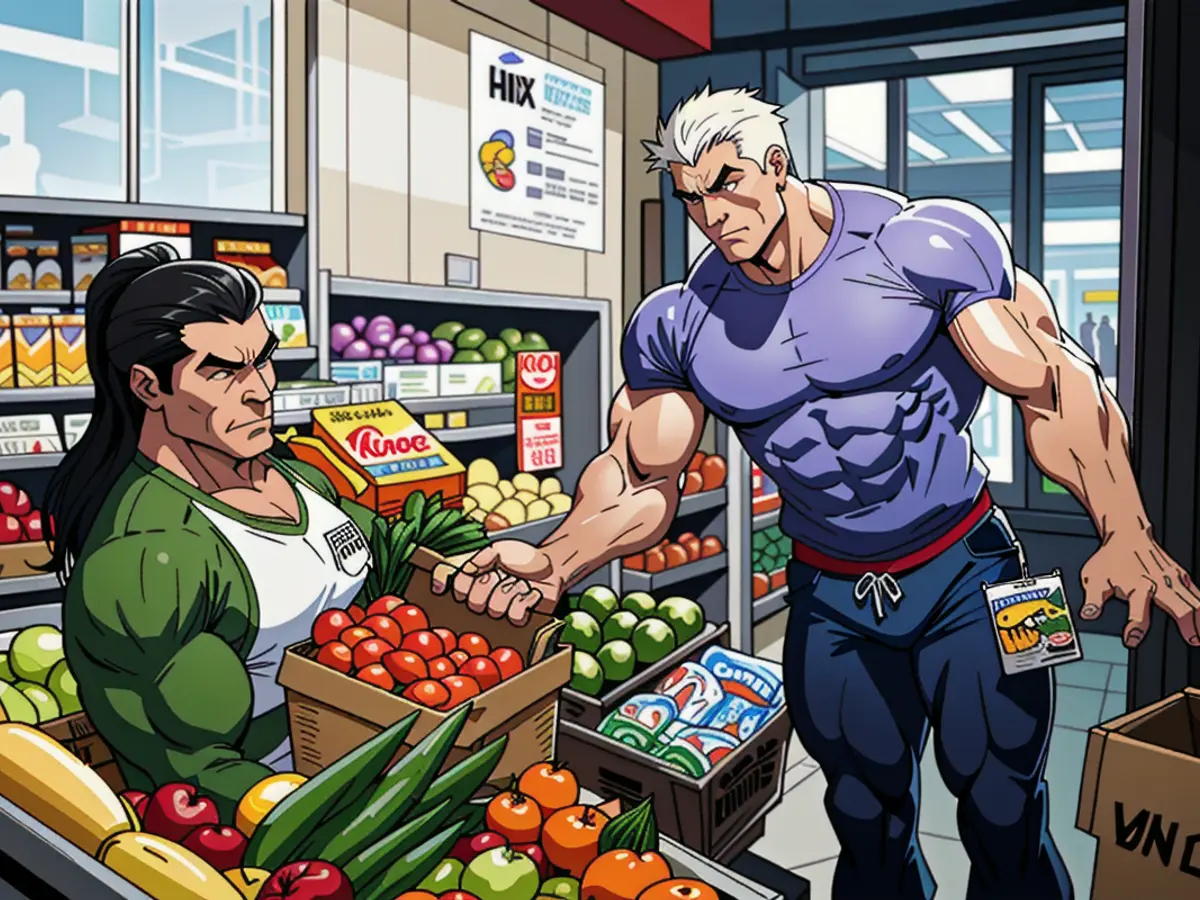Exploring the Process of Acquiring H-E-B Grocery Shares: Are They Available on Public Markets?
Similar to numerous sectors, the grocery industry flourishes more in Texas. Numerous merchants have elevated their Texas strategies, motivated by the escalating population and the prospect of profits. Yet, few have managed to attain the near-legendary status enjoyed by H-E-B Grocery, a San Antonio-based establishment established in 1905.
This family-operated grocery store boasts approximately 430 outlets in Texas and Mexico, and over the past century, it has become a symbol of the state. Regrettably for potential investors, however, the grocer is not publicly listed, and the only means of acquiring a direct stake in H-E-B ownership is to secure employment there.
Publicly Listed?
Is H-E-B publicly listed?
H-E-B, headquartered in San Antonio, is not publicly listed, and it appears unlikely to launch an initial public offering (IPO) imminently, or perhaps ever. The company has remained in the hands of the Butt family since its inception. H-E-B is an acronym for Howard E. Butt, who began delivering groceries from a wagon as a boy and assumed control of the original store in Kerrville, Texas, from his mother in 1919.
IPO
An IPO (Initial Public Offering) represents the first sale of stock by a private company to the public, thereby transforming it into a publicly traded entity. The Texan populace harbors a strong affinity for established, local institutions that emphasize their connection to the state. However, this does not preclude the possibility of a sale or IPO in the future. Pace Foods, the creator of Pace Picante, was a family-owned business in Paris, Texas, that was acquired by Camden, New Jersey-based Campbell Soup (NYSE:CPB) in 1994.
Lone Star beer was acquired in 1999 by the Milwaukee-based Pabst Brewing Co., but it was returned to its San Antonio headquarters in 2020. Even the iconic Whataburger, a source of comfort food for Texans since the 1950s, was sold to a Chicago-based private equity firm in 2019.
Although it's not entirely implausible, it remains highly unlikely that the Butt family will decide to make H-E-B public, given the company's position as the fifth-largest private firm in the United States.
When will it IPO?
When will H-E-B IPO?
H-E-B has not announced any plans for an IPO. Despite the sale of several iconic Texas brands to out-of-state interests in recent years, the family-owned business seems reluctant to transition into a publicly traded company. However, an H-E-B IPO would likely elicit widespread interest, both within and beyond Texas.
Publicly Traded Company
A company whose shares are publicly traded, meaning they are available for purchase and sale on the stock market.
Overview
H-E-B Overview
The company has thrived in some of the most rapidly growing markets, despite fierce competition from giants such as Kroger (KR -0.67%), Albertsons (ACI 0.45%), Walmart (WMT -1.22%), Costco (COST -1.72%), and Amazon's (AMZN -1.45%) Whole Foods.
In the mid-1990s, its upscale grocery concept, Central Market, became a formidable competitor to Austin-based Whole Foods as an organic foods challenger. The company pioneered a store layout that guided customers through high-margin areas.
H-E-B announced a plan in 2015 to bestow stock on 55,000 U.S. employees. It distributed 15% of its ownership to employees aged 21 and older who had worked there for at least a year and had logged 1,000 hours. Employees were awarded non-voting shares equivalent to 3% of their salary (vested after three years) and $100 in stock for each year of consecutive employment.
The company has made significant contributions to the community, donating an estimated 5% of its pre-tax earnings to civic and charitable organizations for over 80 years. The H-E-B Tournament of Champions is slated to contribute $15 million to charities in 2024, amounting to a total donation of $160 million over the past 38 years.
H-E-B has also strengthened its community support by investing heavily in disaster preparedness, a crucial concern for the state's economy. When Hurricane Harvey ravaged Southeast Texas in 2017, causing approximately $125 billion in damages, H-E-B deployed a fleet of disaster relief trailers equipped with kitchens, pharmacies, and automatic teller machines.
Unlike numerous other businesses, which were left crippled by the disaster for weeks, H-E-B was proactive by scouting multiple routes from distribution centers to stores. It dispatched additional truck drivers to Houston, Texas, where the most severe damage occurred, and collaborated with federal relief agencies to supply water to flooded neighborhoods.
H-E-B received praise again in 2020 for its swift and thoughtful response to the COVID-19 pandemic. Former California Governor Arnold Schwarzenegger praised it, referring to it as "a masterclass in preparation and being ready to support your community."
As a privately held company, H-E-B employs 145,000 individuals – referred to as "partners" – and recorded $46.5 billion in revenue in 2024, according to Forbes. H-E-B also placed first in a survey of 60 U.S. grocers based on price, speed and convenience, quality, digital, and operations.

- 2012: $18.7 billion dollar mark
- 2013: $20 billion dollar mark
- 2014: $20 billion dollar mark
- 2015: $22 billion dollar mark
- 2016: $23 billion dollar mark
- 2017: $23 billion dollar mark
- 2018: $25 billion dollar mark
- 2019: $28 billion dollar mark
- 2020: $31.2 billion dollar mark
- 2021: $32.8 billion dollar mark
- 2022: $38.9 billion dollar mark
- 2023: $43.6 billion dollar mark
- 2024: $46.5 billion dollar mark
Should I invest?
Should I invest in H-E-B?
Since H-E-B is a privately held company, it's not possible to buy its shares directly. However, you can invest in publicly-traded grocery stores that are similar to H-E-B and are affected by similar market trends. Some options for these types of investments include:
- Walmart: The largest grocery store chain in the U.S., with over 4,600 stores in all 50 states
- Albertsons: The second-largest retailer in the country, with over 2,300 locations in 35 states
- Kroger: The fourth-largest grocery store chain, with over 1,250 stores across 16 states
(Note that Publix, the third-largest grocery store chain in the U.S., is also privately held.)
Before investing in these alternatives, consider the various factors that influence the financial performance of the grocery industry. Examples include high inflation, rising transportation costs, climate-related disasters, interest rates, and the overall state of the economy.
How to buy
How can I buy H-E-B stock?
If you'd like to purchase shares in one of these alternative grocery stores, you can do so through a brokerage account. Here's a simple step-by-step guide on how to invest in these types of stocks:
Step 1: Open a brokerage account
To buy shares of any company, you'll need to open and fund a brokerage account first. There are plenty of trusted options to choose from, so research them well to find the best one for you.
Step 2: Set a budget
Calculate how much you want to invest in total, then decide how to distribute that money for the best results. Our recommendation is to build a diversified portfolio of at least 25 stocks for a long-term investment horizon.
Step 3: Research
Before buying shares, make sure to thoroughly research each company. Look into their competition, financials, business model, and other relevant factors to ensure they can create long-term value for their shareholders.
Step 4: Place an order
Once you've decided which company to buy shares from, go to your brokerage account's order page. Fill out the necessary information, including the number of shares or the investment amount, the stock ticker, and whether you prefer a limit or market order. A market order guarantees immediate purchase at the current market price.
ETF options
Are there ETFs with H-E-B exposure?
Since H-E-B is a privately-held company, there are no ETFs that directly give you exposure to it. However, you can still gain exposure to the grocery industry through public companies and ETFs that bundle food retailers and consumer staples into a single investment. Some examples include:
ETF
An ETF allows investors to buy a basket of stocks or bonds in one easy and liquid investment. Here are a few options to consider:

Investors can follow a similar process to buy ETF shares that have exposure to the grocery industry when H-E-B eventually goes public, should that ever happen. Just make sure to update your stock ticker and submit your order through your brokerage account.
- The Invesco Dynamic Food & Beverage ETF (PBJ -0.63%) holds around $112.9 million in assets and has a 0.62% fee structure, resulting in a charge of $6.20 for every $1,000 invested. This ETF primarily focuses on food manufacturing companies, such as Kroger (5.1%), Kraft Heinz (KHC 0.43%), and Coca-Cola (KO -0.19%) (both at 4.9%).
- Another suitable option is the Consumer Staples Select Sector SPDR Fund (XLP -0.49%). Managing $17.4 billion in assets and boasting a 0.09% fee structure, this ETF includes top holdings like Costco (10.7%), Walmart (9.9%), Procter & Gamble (PG -0.37%), and Target (TGT -0.65%) (3.6%).
- The Vanguard Consumer Staples Fund (VDC -0.54%) boasts $7 billion in assets and a low fee structure of 0.1%. Sharing similar holdings to the SPDR fund, including Procter & Gamble (12.4%), Costco (12.3%), Walmart (11.4%), and Target (2.4%), this ETF also has a low management fee.
Related investing topics
**#### Investing in Food ETFs
Exploring the leading food ETFs in the U.S. equities market this year.****#### Investing in Fast-Food Stocks
Supercharge your portfolio with these fast-food titans.****#### 6 Food Delivery Stocks to Watch
These businesses offer both food and investing opportunities.****#### How to Invest in Instacart
Instacart assists brick-and-mortar grocery stores by providing the technology foundation for online grocery sales.
The lowdown on H-E-B
The likelihood of H-E-B going public in the current IPO landscape is slim. However, the retailer's success, strong presence in Texas and Northeastern Mexico, and ongoing expansion make it an alluring opportunity that must be monitored. Think of it as a local Aldi: a successful, family-run grocery chain with a dedicated customer base.
H-E-B may never go public, but there are avenues to invest in similar companies by buying shares of competitors or ETFs that follow consumer staples stocks. This isn't a pure-play investment, but H-E-B is likely to prosper as more Americans rediscover the financial and social benefits of homemade meals.
FAQs
FAQs on H-E-B Investment
Can I buy H-E-B stock?
No, H-E-B is a privately-owned, family-operated company.
What is the H-E-B stock plan for employees?
H-E-B offers non-voting shares to employees as part of their compensation, with a vesting period of three years and an additional $100 for every year of service.
Can H-E-B employees own stock?
Employees of H-E-B are eligible for shares after meeting certain criteria, including being 21 or older, working for at least a year, and having recorded 1,000 work hours.
Are grocery stores a good investment opportunity?
While profit margins can be small, the consumer staples sector can present a solid investment due to constant consumer demand, both during good and challenging economic times. Groceries have benefited from recent inflation as dining out prices have soared, making home-cooked meals a more affordable option.
John Mackey, a former CEO of Whole Foods Market (an Amazon subsidiary), serves on Our Website’s board of directors. None holds no positions in any of the mentioned stocks. Our Website holds investments in Amazon, Costco Wholesale, Target, and Walmart. Our Website recommends Kraft Heinz and Kroger. Our Website adheres to a disclosure policy.
Although H-E-B, the famed grocery store chain, is privately held and not publicly listed, potential investors seeking exposure to the grocery industry may consider investing in publicly-traded grocery stores such as Walmart, Albertsons, or Kroger. Alternatively, investors can consider ETFs that bundle food retailers and consumer staples, like the Invesco Dynamic Food & Beverage ETF, Consumer Staples Select Sector SPDR Fund, or Vanguard Consumer Staples Fund.






